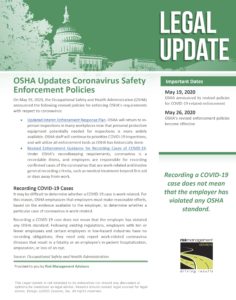On May 19, 2020, the Occupational Safety and Health Administration (OSHA) announced the following revised policies for enforcing OSHA’s requirements with respect to coronavirus:
- Updated Interim Enforcement Response Plan. OSHA will return to in-person inspections in many workplaces now that personal protective equipment potentially needed for inspections is more widely
available. OSHA staff will continue to prioritize COVID-19 inspections, and will utilize all enforcement tools as OSHA has historically done. - Revised Enforcement Guidance for Recording Cases of COVID-19. Under OSHA’s recordkeeping requirements, coronavirus is a recordable illness, and employers are responsible for recording
confirmed cases of the coronavirus that are work-related and involve general recording criteria, such as medical treatment beyond first aid or days away from work.
Recording COVID-19 Cases
It may be difficult to determine whether a COVID-19 case is work-related. For this reason, OSHA emphasizes that employers must make reasonable efforts, based on the evidence available to the employer, to determine whether a particular case of coronavirus is work-related.
Recording a COVID-19 case does not mean that the employer has violated any OSHA standard. Following existing regulations, employers with ten or fewer employees and certain employers in low-hazard industries have no recording obligations; they need only report work-related coronavirus illnesses that result in a fatality or an employee’s in-patient hospitalization, amputation, or loss of an eye.
Important Dates
May 19, 2020
OSHA announced its revised policies for COVID-19-related enforcement
May 26, 2020
OSHA’s revised enforcement policies become effective
Recording a COVID-19 case does not mean that the employer has violated any OSHA standard
Source: Occupational Safety and Health Administration
This Legal Update is not intended to be exhaustive nor should any discussion or opinions be construed as legal advice. Readers should contact legal counsel for legal advice. Design ©2020 Zywave, Inc. All rights reserved.

OSHA Updates Coronavirus Safety Enforcement Policies

